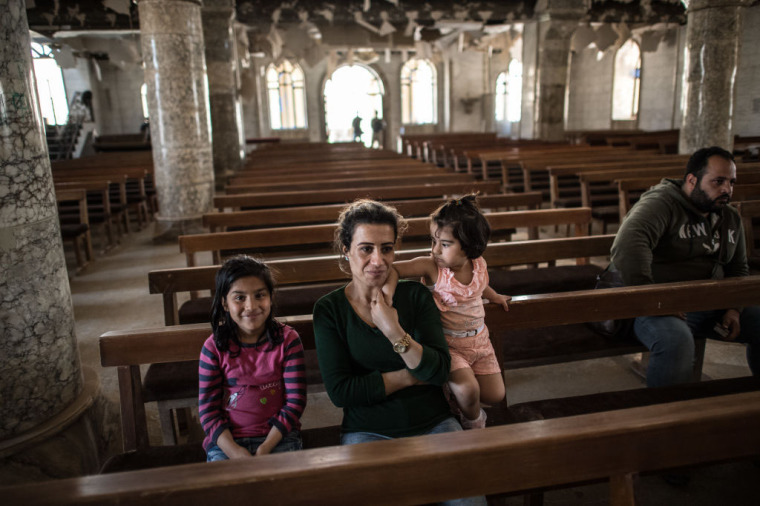Church leaders raise concerns over Christianity’s future in Iraq
 By Anugrah Kumar, Christian Post Contributor |
By Anugrah Kumar, Christian Post Contributor |
A woman and her children attend an Easter ceremony in Saint John’s Church (Mar Yohanna) in the nearly deserted predominantly Christian Iraqi town of Qaraqosh on April 16, 2017, near Mosul, Iraq. | Carl Court/Getty Images
The Islamic State has been defeated and bombings and kidnappings have also decreased, but Iraq’s Christians still don’t find the cradle of Christianity livable and continue to leave the country that has now become a land of militias, causing concerns among church leaders.
St. Joseph’s parish in Baghdad once had 5,000 families, but the number has now reduced to 150 thanks to a mass exodus in the last decade to the West. “They feel there is no peace, law or justice here in Baghdad, and that our country has become a land of militias,” the parish priest, Father Nadheer Dako, told The Telegraph.
A parishioner, Nasib Hana Jabril, further explained, “It is true that people are no longer getting kidnapped as much, and the Islamic State is gone. But the infrastructure of the country has been ruined, and people want a better future, not so much for themselves but for their children.”
Christians are also concerned about their safety, as they don’t have traditional tribal networks for self-defense. “We have no tribe here, so if things go wrong, there is nobody here to help us,” the parishioner revealed.
Dako, who earlier served as a priest in London, confirmed what the parishioner said. “Returning here from London after six years, I’ve noticed how the quality of education in Baghdad has gone down in nearly all the primary schools. The new generation just have very little hope of making a life here anymore.”
If Christians continue to leave, Dako fears, “Will there still be a Christian community here in Baghdad in 2050?”
The persecution facing Christians and other minorities in Iraq is “unprecedented,” said Loay Mikhael, head of foreign relations for the Chaldean Syriac Assyrian Popular Council, on Wednesday at the National Prayer Breakfast sideline event on religious persecution worldwide, co-hosted by the Holocaust Museum in Washington, D.C., and 21Wilberforce.
He explained that because of persecution at the hands of the Islamic State, also known as ISIS or IS, the Christian population in Iraq dwindled from 1.5 million to just 250,000. He said his own family was forced to relocate due to persecution.
“We are all over the world,” he said, “not because of our choice, but because we were forced to flee. The challenge is tremendous.”
A Message from Edifi – Christian Podcast App
All Your Christian Podcasts In a Single App
Edifi gives you today’s most popular Christian podcasts all in a single app experience you can trust. Edifi’s powerful app aggregator offers the most Christian-centric streaming audio experience in the world today. Download edifi NOW for Free!
After IS was driven out of Iraq, Christians hoped that life would return to normal and be “prosperous” once again, Mikhael said. Yet, thousands remain displaced, jobless and traumatized with “life taken from them in the presence of the international community.”
Mikhael criticized the Iraqi government for its inaction, explaining that no official has tried to “do something tangibly on the ground to bring those communities back to their lives.”
“It’s really unspeakable,” he said. “I believe, to restore the dignity, you need to create jobs, you need to improve security …”
He urged the international community to make efforts to improve life for Christians, Yazidis, and other minorities in their home countries instead of accepting thousands of refugees every year. “People want to stay,” he stressed. “Nobody wants to leave.”
Last year, some media outlets, including ProPublica, criticized the U.S. Agency for International Development for giving a grant to help restore the Nineveh Plains and strengthen communities victimized by IS, claiming that USAID could be in violation of the Establishment Clause of the U.S. Constitution for “favoring” Iraqi Christian groups for grants in a predominantly Muslim country.
However, some religious freedom advocates said they felt that criticism of USAID funding going to these groups was an attempt to turn America’s bipartisan desire to aid religious minority communities decimated by IS and on the verge of extinction into a “partisan” issue.
“It is irrational, immoral and inconsistent with international human rights theory and policy to argue that the United States should not be helping Christians or a religious group targeted with religious genocide by ISIS,” international human rights lawyer Nina Shea, a senior fellow with the conservative think tank Hudson Institute, told The Christian Post. “Their conclusion is that the U.S. should not be helping religious genocide survivors because they are a religious group even though they were targeted for religious reasons.”
Before the Trump administration came to power in 2017, USAID funding for Iraq was funneled through the United Nations. But many advocates spoke out about how aid funding that was sent to the U.N. was not making its way to help thousands of displaced Christians.
Archbishop Bashar Warda of Erbil, whose Kurdistan-based archdiocese sheltered and fed thousands of displaced Christians afraid they would be persecuted at U.N. displacement camps, was on the forefront of speaking out about how little to no aid was going to help the displaced families his archdiocese was caring for.
https://www.christianpost.com/news/church-leaders-raise-concerns-over-christianitys-future-in-iraq.html
